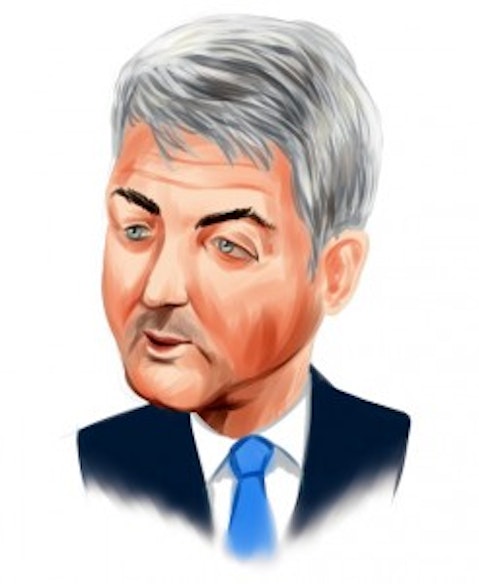
Today, let’s look at investing giant Bill Ackman, who founded Pershing Square Capital Management in 2003. An investor with roots in real estate, Ackman is an activist, often advocating strongly for big changes at companies in which he has invested heavily. Soon after Ackman invested in the Fortune Brands conglomerate, for example, the company began looking to spin off various divisions, which it has now done, breaking up into the alcohol-focused Beam Inc (NYSE:BEAM) and Fortune Brands Home & Security Inc (NYSE:FBHS).
More recently, there has been much ado about Herbalife Ltd. (NYSE:HLF), which Ackman has shorted and in which other high-profile money managers have taken strong long or short positions. The company recently reported robust results, with revenue in 2012 rising 18% over year-earlier levels.
Pershing Square’s reportable stock portfolio totaled $9.2 billion in value as of Dec. 31, 2012, spread over just a small handful of stocks. Now that’s concentration! Its top three holdings make up a whopping 64% of the portfolio’s total value.
Interesting developments
So what does Pershing Square’s latest quarterly 13F filing tell us? Well, for starters, there wasn’t much activity.
The top holdings remain Canadian Pacific Railway Limited (USA) (NYSE:CP), The Procter & Gamble Company (NYSE:PG), and General Growth Properties Inc (NYSE:GGP). Railroads are attractive these days, grabbing more transportation business as the steep price of oil makes their economics more appealing. Thus, Canadian Pacific is positioned to profit as our recovering economy boosts its overall shipping volume. Its new CEO, meanwhile, is cutting thousands of jobs, aiming for a leaner company. The stock is up 58% over the past year, with management expecting a big boost in earnings in 2013.
Procter and Gamble (NYSE:PG) is Pershing’s second-largest holding and sports a 2.9% dividend yield. It has lost fans in recent years, with some analysts, citing value-destroying share buybacks, a significant debt load, and the lack of a confidence-inspiring growth strategy.
Retail REIT General Growth Properties, meanwhile, yields 2.4%, and has emerged from bankruptcy protection with restructured debt and reported funds from operations (FFO) up 9% in its last quarter. It has been selling off its more poorly performing properties in order to strengthen its portfolio and pay down debt. Ackman had agitated for the company to be sold, but has recently dropped that idea, agreeing to be a passive investor. The stock is not the bargain it used to be, though. Its FFO rose nearly 14% over the past fiscal year.
Another key holding is a controversial one, J.C. Penney Company, Inc. (NYSE:JCP). While many are steering clear, worried about debt, negative free cash flow, and the company’s rebranding efforts, Ackman has suggested that he might earn 15 times his investment in the company.
The only big closed position was Alexander & Baldwin Inc (NYSE:ALEX), which operates diversified businesses primarily in Hawaii (think real estate, agriculture, shipping). In its last quarter, it posted a solid profit, vs. a loss a year earlier.
We should never blindly copy any investor’s moves, no matter how talented the investor. But it can be useful to keep an eye on what smart folks are doing. 13-F forms can be great places to find intriguing candidates for our portfolios.
The article Here’s What Bill Ackman Has Been Buying and Selling originally appeared on Fool.com and is written by Selena Maranjian.
Longtime Fool contributor Selena Maranjian, whom you can follow on Twitter, owns shares of Procter & Gamble. The Motley Fool recommends Beam and Procter & Gamble. The Motley Fool has the following options: long Jan 2014 $50 calls on Herbalife.
Copyright © 1995 – 2013 The Motley Fool, LLC. All rights reserved. The Motley Fool has a disclosure policy.





